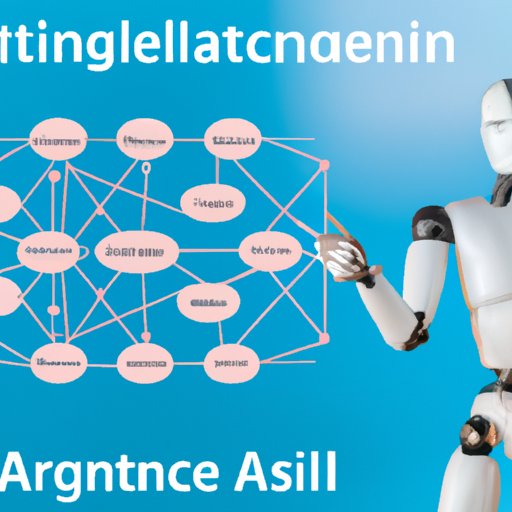Introduction
An AI algorithm is a type of computer program that is designed to simulate the thought process of humans in order to solve complex problems. AI algorithms are used to automate processes, analyze data, and make decisions. This article will explore the history of AI algorithms, their types, benefits, ethical implications, applications, and challenges.

Historical Overview and Explanation of AI Algorithms
The concept of AI algorithms has been around since the 1950s, when Alan Turing developed the Turing Test to measure a computer’s ability to think like a human. Since then, AI algorithms have become increasingly sophisticated, and they are now used in many different fields. There are three main types of AI algorithms: supervised learning, unsupervised learning, and reinforcement learning.

Exploring the Types of AI Algorithms
Supervised learning involves using labeled data to teach a computer how to recognize certain patterns or objects. The computer is given a set of inputs and outputs, and it learns by repeating these tasks until it can accurately identify the inputs and outputs. Unsupervised learning does not require labeled data, and instead relies on the computer to find patterns within the data itself. Reinforcement learning involves rewarding the computer for taking the correct action, and punishing it for taking the wrong one.
Analyzing How AI Algorithms are Used in the Real World
AI algorithms are used in a variety of industries, including finance, healthcare, and transportation. In finance, AI algorithms are used to automate trading, detect fraud, and develop investment strategies. In healthcare, AI algorithms can be used to diagnose medical conditions and recommend treatments. In transportation, AI algorithms are used to optimize routes and develop autonomous vehicles.
Examining the Ethical Implications of AI Algorithms
The use of AI algorithms raises ethical concerns, as they can potentially lead to job loss, privacy violations, and biased decision-making. It is important for companies to ensure that their AI algorithms are properly tested and monitored, and to put safeguards in place to protect against potential negative effects.
Investigating the Potential Applications of AI Algorithms
AI algorithms have a range of potential applications, including automation, healthcare, and business. Automation is the process of using machines to automate repetitive tasks, and AI algorithms can be used to streamline this process. In healthcare, AI algorithms can be used to monitor patient health and provide personalized treatment plans. In business, AI algorithms can be used to improve customer service, optimize marketing campaigns, and automate administrative tasks.

Exploring the Challenges of Using AI Algorithms
Using AI algorithms can present a number of challenges, including technical challenges and cost challenges. Technical challenges include the need for large amounts of data, the complexity of developing AI algorithms, and the difficulty of interpreting the results. Cost challenges can include the high cost of developing and maintaining AI algorithms, as well as the cost of training employees to use them.

Comparing AI Algorithms to Other Types of Algorithms
AI algorithms are often compared to other types of algorithms, such as heuristic algorithms and genetic algorithms. Heuristic algorithms are designed to solve problems by making decisions based on experience and intuition. Genetic algorithms are designed to evolve solutions to problems over time through a process of selection and mutation.
Conclusion
In conclusion, AI algorithms are a powerful tool that can be used to automate processes, analyze data, and make decisions. They have a range of potential applications, but also come with a number of ethical considerations and challenges. AI algorithms should be used responsibly, and compared to other types of algorithms when considering their use. With proper implementation, AI algorithms can be a valuable asset for businesses and individuals alike.
(Note: Is this article not meeting your expectations? Do you have knowledge or insights to share? Unlock new opportunities and expand your reach by joining our authors team. Click Registration to join us and share your expertise with our readers.)
